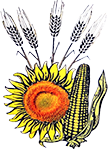Exogenous Salicylic Acid Utilization as a Stress-Signal Compound and Its Impact on Germination and Morphogenetic Reaction of Cabbage Plants Cultivated “In vitro”
Tina Oana Cristea, Gabriel-Alin Iosob, Alexandru Bute
Stațiunea de Cercetare-Dezvoltare pentru Legumicultură din Bacău
Keywords: shoot, roots, regeneration, defence-related process, germination.
Abstract: Salycilic acid is a phenolic compound that can reduce the sensitivity of plants to biotic and abiotic stresses through the activation of stress-responsive gene expression. It enhance defence-related processes such as: rate of transpiration, stomatal movement, photosynthetic rate, polyphenol and chlorophyll content, cell wall thickness, simultaneously with the regulation of growth and development. It is well known that “in vitro” culture is one of the most effective experimental models in the investigation of various aspects related to the structure and functions of the plant cell and tissues. Despite the positive impact that this stress-signal molecule has on the antioxidant defence system, there are few studies on the establishment of the most effective concentration and its impact on the growth and development of cabbage plants cultivated “in vitro”. Thus, in our experiment we assessed the impact of three different concentration of salycilic acid (1 mM/l, 0.5 mM/l and 0.1 mM/l) on seed germination indexes, shoot initiation and proliferation, root development as well as physiologic traits (phenolyc and chlorophyll content).
The results show that a concentration of 1 mM SA inhibited both seed germination and shoot development, which is probably related with supression of GA-mediated pathway. Instead, the addition of 0.1 mM SA stimulated shoot proliferation rate, shortened the time for shoot initiation and increased shoot and root elongation. The content in phenolyc and chlorophyll was higher in plants regenerated on this variant also, which indicates the beneficial effect of addition of 0.1 mM SA on defence related processes.
Our results provide the foundation of further studies related to the plant`s agronomic performances when cultivated in the field.
